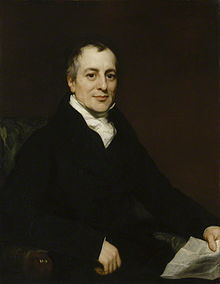David Ricardo
| David Ricardo | |
|---|---|

Portrait of David Ricardo by Thomas Phillips, circa 1821. This painting shows Ricardo, aged 49, just two years before his death.
|
|
| Born |
18 April 1772 London, England |
| Died | 11 September 1823 (aged 51) Gloucestershire, England |
| Nationality | British |
| School or tradition |
Classical economics |
| Influences | Smith · Bentham |
| Influenced | Ricardian Socialists · George · John Stuart Mill · Sraffa · Wicksell · Barro · John Ramsay McCulloch · Karl Marx · Franz Oppenheimer |
| Contributions | Ricardian equivalence, labour theory of value, comparative advantage, law of diminishing returns, Economic rent |
David Ricardo (18 April 1772 – 11 September 1823) was a British political economist. He was one of the most influential of the classical economists, along with Thomas Malthus, Adam Smith, and James Mill.
Born in London, England, Ricardo was the third of 17 children of a Sephardic Jewish family of Portuguese origin who had recently relocated from the Dutch Republic. His father, Abraham Ricardo, was a successful . He began working with his father at the age of 14. At age 21, Ricardo eloped with a Quaker, Priscilla Anne Wilkinson, and, against his father's wishes, converted to the Unitarian faith. This religious difference resulted in estrangement from his family, and he was led to adopt a position of independence. His father disowned him and his mother apparently never spoke to him again.
Following this estrangement he went into business for himself with the support of Lubbocks and Forster, an eminent banking house. He made the bulk of his fortune as a result of speculation on the outcome of the Battle of Waterloo. Prior to the battle, Ricardo posted an observer to convey early results of the outcome. He then deliberately created the mistaken impression the French had won by initially openly selling British securities. A market panic ensued. Following this panic he moved to buy British securities at a steep discount. The Sunday Times reported in Ricardo’s obituary, published on 14 September 1823, that during the Battle of Waterloo Ricardo "netted upwards of a million sterling", a huge sum at the time. He immediately retired, his position on the floor no longer tenable, and subsequently purchased Gatcombe Park, an estate in Gloucestershire, now owned by Princess Anne, the Princess Royal and retired to the country. He was appointed High Sheriff of Gloucestershire for 1818–19.
In August 1818 he bought Lord Portarlington’s seat in Parliament for £4,000, as part of the terms of a loan of £25,000. His record in Parliament was that of an earnest reformer. He held the seat until his death four years later.
...
Wikipedia
